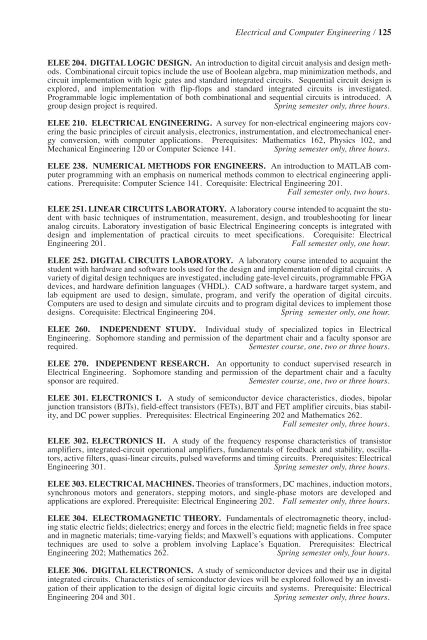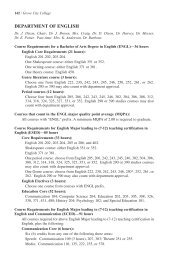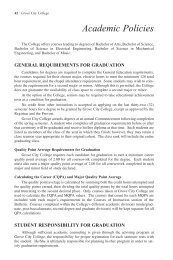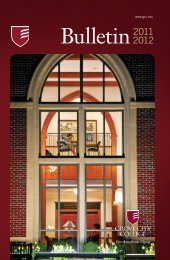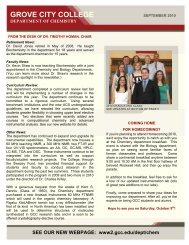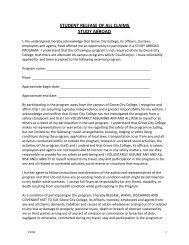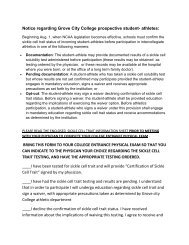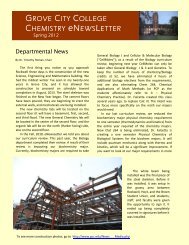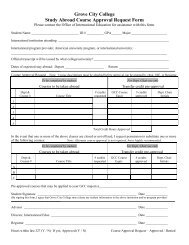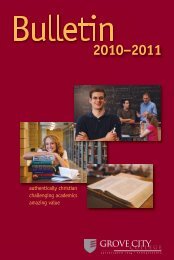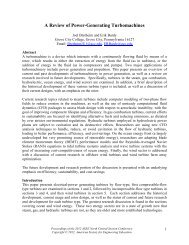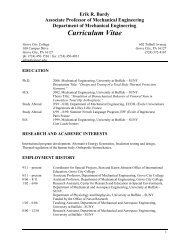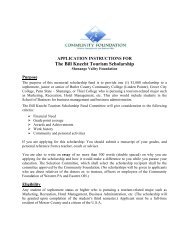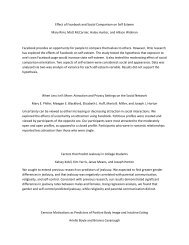2009–2010 - Grove City College
2009–2010 - Grove City College
2009–2010 - Grove City College
You also want an ePaper? Increase the reach of your titles
YUMPU automatically turns print PDFs into web optimized ePapers that Google loves.
Electrical and Computer Engineering / 125<br />
ELEE 204. DIGITAL LOGIC DESIGN. An introduction to digital circuit analysis and design methods.<br />
Combinational circuit topics include the use of Boolean algebra, map minimization methods, and<br />
circuit implementation with logic gates and standard integrated circuits. Sequential circuit design is<br />
explored, and implementation with flip-flops and standard integrated circuits is investigated.<br />
Programmable logic implementation of both combinational and sequential circuits is introduced. A<br />
group design project is required. Spring semester only, three hours.<br />
ELEE 210. ELECTRICAL ENGINEERING. A survey for non-electrical engineering majors covering<br />
the basic principles of circuit analysis, electronics, instrumentation, and electromechanical energy<br />
conversion, with computer applications. Prerequisites: Mathematics 162, Physics 102, and<br />
Mechanical Engineering 120 or Computer Science 141. Spring semester only, three hours.<br />
ELEE 238. NUMERICAL METHODS FOR ENGINEERS. An introduction to MATLAB computer<br />
programming with an emphasis on numerical methods common to electrical engineering applications.<br />
Prerequisite: Computer Science 141. Corequisite: Electrical Engineering 201.<br />
Fall semester only, two hours.<br />
ELEE 251. LINEAR CIRCUITS LABORATORY. A laboratory course intended to acquaint the student<br />
with basic techniques of instrumentation, measurement, design, and troubleshooting for linear<br />
analog circuits. Laboratory investigation of basic Electrical Engineering concepts is integrated with<br />
design and implementation of practical circuits to meet specifications. Corequisite: Electrical<br />
Engineering 201. Fall semester only, one hour.<br />
ELEE 252. DIGITAL CIRCUITS LABORATORY. A laboratory course intended to acquaint the<br />
student with hardware and software tools used for the design and implementation of digital circuits. A<br />
variety of digital design techniques are investigated, including gate-level circuits, programmable FPGA<br />
devices, and hardware definition languages (VHDL). CAD software, a hardware target system, and<br />
lab equipment are used to design, simulate, program, and verify the operation of digital circuits.<br />
Computers are used to design and simulate circuits and to program digital devices to implement those<br />
designs. Corequisite: Electrical Engineering 204. Spring semester only, one hour.<br />
ELEE 260. INDEPENDENT STUDY. Individual study of specialized topics in Electrical<br />
Engineering. Sophomore standing and permission of the department chair and a faculty sponsor are<br />
required. Semester course, one, two or three hours.<br />
ELEE 270. INDEPENDENT RESEARCH. An opportunity to conduct supervised research in<br />
Electrical Engineering. Sophomore standing and permission of the department chair and a faculty<br />
sponsor are required. Semester course, one, two or three hours.<br />
ELEE 301. ELECTRONICS I. A study of semiconductor device characteristics, diodes, bipolar<br />
junction transistors (BJTs), field-effect transistors (FETs), BJT and FET amplifier circuits, bias stability,<br />
and DC power supplies. Prerequisites: Electrical Engineering 202 and Mathematics 262.<br />
Fall semester only, three hours.<br />
ELEE 302. ELECTRONICS II. A study of the frequency response characteristics of transistor<br />
amplifiers, integrated-circuit operational amplifiers, fundamentals of feedback and stability, oscillators,<br />
active filters, quasi-linear circuits, pulsed waveforms and timing circuits. Prerequisites: Electrical<br />
Engineering 301. Spring semester only, three hours.<br />
ELEE 303. ELECTRICAL MACHINES. Theories of transformers, DC machines, induction motors,<br />
synchronous motors and generators, stepping motors, and single-phase motors are developed and<br />
applications are explored. Prerequisite: Electrical Engineering 202. Fall semester only, three hours.<br />
ELEE 304. ELECTROMAGNETIC THEORY. Fundamentals of electromagnetic theory, including<br />
static electric fields; dielectrics; energy and forces in the electric field; magnetic fields in free space<br />
and in magnetic materials; time-varying fields; and Maxwell’s equations with applications. Computer<br />
techniques are used to solve a problem involving Laplace’s Equation. Prerequisites: Electrical<br />
Engineering 202; Mathematics 262. Spring semester only, four hours.<br />
ELEE 306. DIGITAL ELECTRONICS. A study of semiconductor devices and their use in digital<br />
integrated circuits. Characteristics of semiconductor devices will be explored followed by an investigation<br />
of their application to the design of digital logic circuits and systems. Prerequisite: Electrical<br />
Engineering 204 and 301. Spring semester only, three hours.


